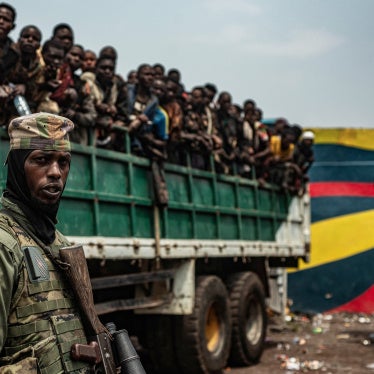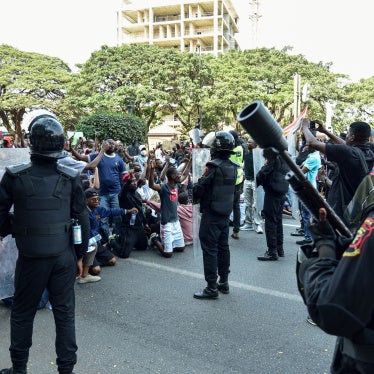Introduction
This submission highlights Human Rights Watch’s concerns about Angola’s compliance with its international human rights obligations since its previous Universal Periodic Reviews (UPR) in 2014 and 2019. The submission focuses on problems related to arbitrary arrest and detention, extrajudicial killings and police brutality, the security law, and migrants’ rights.
Arbitrary Arrest and Detention
Despite accepting recommendations in 2014 from Italy and Spain and in 2019 from Czechia on investigating and preventing cases of arbitrary arrests, detention and torture, and brining those responsible to justice, arbitrary arrests and detentions continue to be a significant issue, particularly in the oil-rich enclave of Cabinda.
In the most recent case, on March 25, 2023, police detained three organizers and 45 participants attending a human rights workshop in Cabinda. Most of the detained people were questioned and released in the 48 hours that followed, but seven were charged with criminal association and rebellion, and at time of writing they were awaiting trial.
In April 2022, Angolan authorities arrested 22 protesters in Luanda during peaceful protests against the detention of political prisoners and charged them with rioting and disobeying an order to disperse. In June 2020, Maurício Gimbi, president of the Union for the Independence of Cabinda (UIC), Joao Mampuela, vice president of UIC, and André Bonzela, director of UIC president’s office in Cabinda, were arrested a few days after UIC leaflets were displayed in the streets of the city of Cabinda with the following messages: “For the end of the right to bear arms” and “Cabinda is not Angola.” These three individuals were detained and charged with rebellion, outrage against the state, and criminal association, in violation of their rights protected under Angola’s Constitution, as well as international law. They were conditionally released in February 2021, after seven months in detention, subject to surrendering their passport and informing the authorities about any change in address, among other restrictions. In May 2019, Hitler “Samussuku” Tshikonde, a political activist, was arbitrarily jailed for 72 hours without charge or access to a lawyer, and was later informed he was under investigation for “insulting the president.”
Recommendations
- Fully respect the rights to freedom of expression and peaceful assembly including by undertaking necessary legal reform, and ensuring all state agents respect and protect both rights in practice;
- Ensure that pro-democracy and human rights activists and non-violent separatist activists and groups, can fully express their opinions, including criticism of government policies, and pursue non-violent activities and without intimidation, harassment, or risk of arbitrary arrest;
- Release all individuals arrested because they participated in peaceful demonstrations and drop all politically motivated charges.
Extrajudicial Killings and Police Brutality
Despite unjustified use of force being an issue in previous UPRs, and Angola’s acceptance of a 2019 recommendation by Czechia to “Investigate all allegations of extrajudicial killings, arbitrary arrests and torture by the police and security forces, bring perpetrators to justice and compensate victims”, Angolan police continue to be implicated in several extrajudicial killings. Between January and August 2023, Angolan security forces carried out at least 15 unlawful killings of political activists and peaceful protestors. Among those, at least five people were killed in Huambo in June 2023 during a taxi drivers’ protest against a fuel-price increase. In January 2021, security forces killed at least 10 unarmed protesters in a protest organized by the Lunda Tchokwe Protectorate Movement in Lunda Norte province to demand better public services in Cafunfu. More than 20 people were injured and 16 people were detained. In November 2020, Angolan police killed one protester in Luanda during an anti-government protest.
Angolan police also continued to use excessive and unnecessary force against peaceful protestors, including during a protest by women street traders in Luanda in June 2023. The police met the protesters with dogs and fired tear gas at the crowd without warning, before pursuing the protesters and beating them with batons. In November 2020, during an anti-government protest, the police used live bullets, tear gas and dogs to disperse protesters, and beat two well-known activists, Nito Alves and Laurinda Goveia, and arbitrarily arrested activist Luaty Beirao.
Recommendations
- Increase efforts to prevent, investigate, and appropriately prosecute extrajudicial executions and other serious violations by the police;
- Investigate allegations of excessive use of force and other human rights abuses by police, military, and other state officials. Hold all those responsible for abuses to account;
- Inform the public of the results of such investigations and promptly reply to individual complaints about police abuses.
- Facilitate the visit requested by the UN Special Rapporteur on extra-judicial summary or arbitrary executions.
Security Law
In April 2024, Angola’s parliament proposed a new national security law that threatens citizens’ rights and does not meet international human rights standards. It passed a first vote in parliament in January 2024 and is expected to be submitted to parliament for final approval. The draft law would permit excessive government control over private institutions, including media organizations, and undermines the rights to freedom of the press, of expression, and of association. It would give the government authority to interfere with the media and civil society groups in worrying ways and is incompatible with the right to freedom of expression, including press freedom, guaranteed under the International Covenant on Civil and Political Rights, which Angola ratified in 1992, and reflected in the Angolan constitution. Domestic and international human rights groups have been highly critical of the draft law, which follows multiple other repressive legislation approved by the Angolan government in recent years, such as the media law of 2017 and the law on the status of nongovernmental organizations approved in May 2023, and currently pending adoption.
Recommendations:
- Revise or withdraw the proposed new national security law, and in the meantime urge the Angolan parliament not to approve the national security law;
- Ensure the rights to freedom of the press, expression, and association are respected by the Angolan government and security forces;
Ensure national security laws are drafted in line with international law, including safeguards against misused by government officials, and implemented in ways that respect and protect human rights.
Migrants’ Rights
Angolan security forces have been implicated in serious abuses against migrants. In April 2023, security forces allegedly raped migrant women and children from the Democratic Republic of Congo and otherwise abused them during mass expulsions of migrant workers. The abuses were confirmed by a United Nations investigation. This comes after a call by Human Rights Watch in 2018 to the Angolan government to suspend the abusive deportation of Congolese migrants and conduct an investigation into alleged abuses by state security forces.
In May, dozens of former Angolan migrants to Namibia, including children who were found begging or selling wooden artifacts on the streets of Namibia, were repatriated back to Angola. Many of the children are from Angola’s southern Cunene, Huila, and Namibe provinces, where the worst drought in four decades has caused severe food shortages and livestock deaths. Over the years, thousands have fled the region and crossed the border to Namibia in search of food and jobs. In recent years, Angola has resettled repatriated children in a government-managed camp in Cunene province, where at least six children reportedly died in 2021.
Recommendations:
- Investigate all reports of human rights abuses by police, military and other security forces against migrants, and hold those responsible to account;
- Increase efforts to prevent any human rights abuses by police, military and other security forces against migrants;
- Encourage the continued respect of international laws for the protection of refugees, asylum seekers and migrants.








